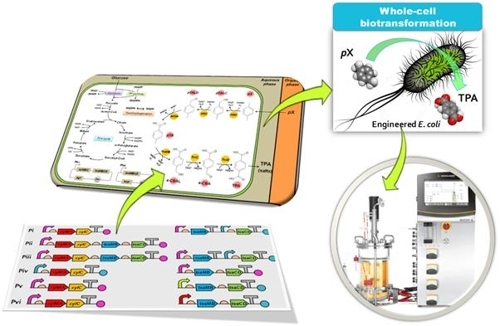A group of South Korean scientists have developed a new eco-friendly method to chemically produce terephthalic acid, which is largely used for polyethylene terephthalate, the science ministry said Sunday, a development that could be a boon in the mass production of next-generation industrial plastic.
TPA is a large-volume commodity chemical used principally as a monomer precursor in the manufacture of polyethylene terephthalate, which finds a broad range of applications in making beverage containers, films, and other applications. TPA is an important industrial chemical currently produced by the energy intensive and potentially hazardous p-xylene (pX) oxidation process.
 |
(Photo courtesy of the Ministry of Science, ICT and Future Planning) |
The team, led by Lee Sang-yeob at the Korea Advanced Institute of Science and Technology, successfully designed a synthetic metabolic pathway converting pX to TPA, the Ministry of Science, ICT and Future Planning said.
"Here we report the development of a metabolically engineered Escherichia coli system for biological transformation of pX into TPA," the researchers said in a paper.
"This research allows the production of eco-friendly plastic when serious issues such as climate change, environment issues and depletion of fossil fuels have arisen recently amid the rising demand for chemical products based on fossil fuels," said Lee.
"In this study, we report a biocatalytic process for the oxidation of pX to TPA by developing a metabolically engineered E. coli strain harboring a synthetically designed pathway," the paper continued.
Their findings were published in the latest edition of the journal "Nature Communications." (Yonhap)







![[Today’s K-pop] Blackpink’s Jennie, Lisa invited to Coachella as solo acts](http://res.heraldm.com/phpwas/restmb_idxmake.php?idx=644&simg=/content/image/2024/11/21/20241121050099_0.jpg)
